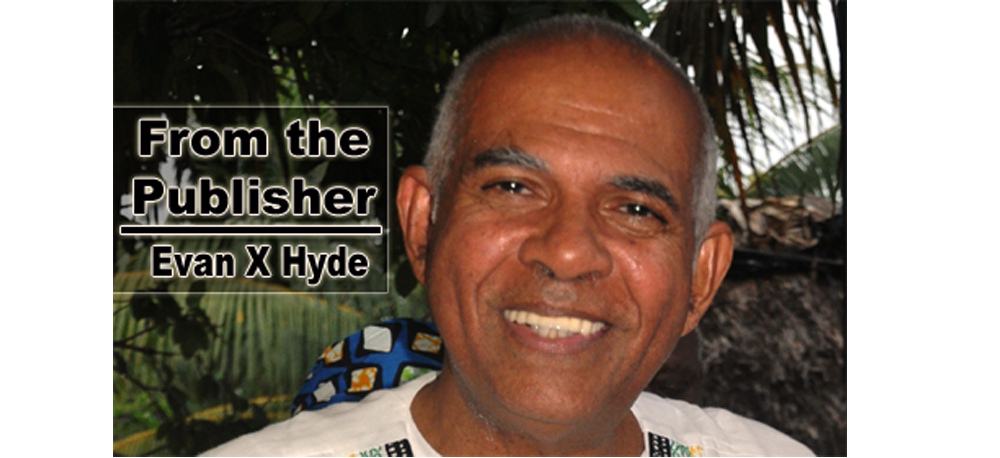I think there is a mistake in the sixth paragraph of my column last Friday. In that column, I said that Mexico and the Central American republics declared independence from Spain in 1823. Actually, I believe Mexico and the said republics declared that independence in 1821, and then the Central Americans and Chiapas broke away from Mexican rule in 1823.
They say that every action has an equal and opposite reaction. Because of my plane phobia, five of my ten trips to and from the United States (1965, 1967, 1971, 1979, and 2012) were by road, through Mexico, and I developed a deep and abiding interest in that republic and its people. I had experiences those of you who fly would not have had.
I have urged you to study the works of Penn State University Professor of Latin American Studies, Matthew Restall, because his research establishes that, through the centuries, the relationship between people of African and Mayan descent in the Yucatan has been cordial, often intimate.
It was, of course, to the Yucatan that the African slaves in the settlement of Belize would flee from the British, whereupon they would be granted freedom in the Yucatan once they accepted the Catholic religion. Most of these fugitive slaves took Mayan wives, and their offspring became legally and totally Mexican.
Anglophiles in Belize don’t want to hear about this, because it means that conditions across Belize’s northern border with the Yucatan were seen as better by our ancestors than those conditions in Belize under British slavery.
In any case, the point of this column is to look at the uncomfortable fact that Belize is now experiencing land and social disputes and conflict in Toledo, our southernmost district, between Belizeans of African descent, on the one hand, and our citizens of Mayan descent, on the other. This is the opposite of the historical relations between Mexicans of African and Mayan descent in the Yucatan. Restall’s work is definitive.
You ask yourself: why is this so? Toledo has more available land, as far as I am aware, than any of Belize’s other five districts. But it is becoming more and more obvious that the lands and seas of Toledo are oil and mineral rich. This means that the chances are there are massive corporate forces from abroad which have an interest in supporting any of the two sides, which will allow them to exploit aforementioned oil and minerals.
Human beings have always been fighting among themselves. Historians tell us of an original Stone Age, when men used tools and weapons made of stone. Then came the Bronze Age, bronze tools and weapons being more efficient than those of stone. This was followed by an Iron Age, and then, of course, came steel.
Today, man’s tools and weapons are made of exotic and rare metals and minerals like cobalt, lithium, uranium, and so on, which are very expensive, because of their scarcity. So then, Belize runs the risk of becoming like many poor countries in Africa, South America, and around the world, which possess petroleum and other mineral and metal deposits on which the developed economies depend to manufacture their modern tools and weapons. In poor countries, the corporate forces finance elements within those countries which are loyal to them, where making their valuable natural resources available at cheap prices for their factories is concerned.
In poor countries with valuable natural resources, then, armed and warring factions emerge which are loyal to different developed nations and different corporate giants. Elections in countries like these are often violent: political power will enable financial wealth for those natives who come out as winners in elections and wars.
I was going to say the Yucatan has no significant natural resources, except their wonderful beaches in Cancun, Playa, Tulum, and so on, but then I remembered that the Yucatan has petroleum deposits, including offshore ones in the Gulf of Mexico.
Under the dictator Porfirio Diaz (who went into exile when the Mexican Revolution began in 1910), Mexico opened its petroleum extraction to British, German, and other foreign companies, but then President Lazaro Cardenas, around 1939 or so, nationalized Mexico’s oil. He formed Pemex, the Mexican oil company.
I close with an anecdote from the summer of 2012. Travelling by road on a return trip from Arizona to Belize, we saw a large cargo truck of some kind deep in the bush off the right side of the highway. It had apparently crashed. The question was whether the driver was dead, because poor people materialized out of the bush as if by magic, and stripped that truck clean as a whistle, in a jiffy. This was on the highway to Villahermosa.

